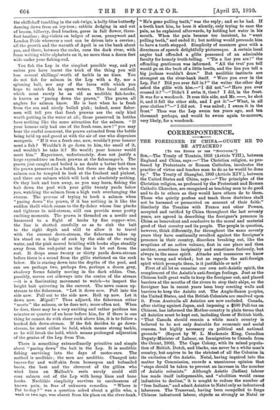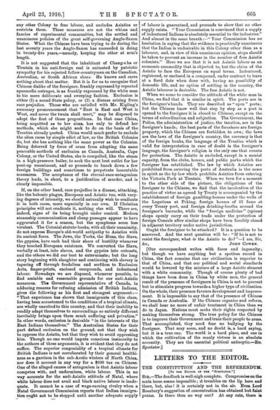CORRESPONDENCE.
THE FOREIGNER IN CHINA.—OUGHT HE TO BE ATTACKED?
TO THE EDITOR OP THE " SPECTATOR.••] Sts,—The Treaty of Tientsin, 1858 (Article V at.), between England and China, says :—" The Christian religion, as pro- fessed by Protestants or Roman Catholics, inculcates the practice of virtue and teaches man to do as he would be done by." The Treaty of Shanghai, 1903 (Article XIV.), between the United States and China, says :—" The principles of the Christian religion, as professed by the Protestant and Roman Catholic Churches, are recognised as teaching men to do good and to do to others as they would have others do to them. Those who quietly profess and teach these doctrines shall not be harassed or persecuted on account of their faith." Similarly the Treaties with France and other Powers, accepted and ratified by China throughout the last seventy years, are agreed in describing the foreigner's presence in China as benevolent and conducive to the moral and material good of that country and its people. The people in question, however, think differently, for throughout the same seventy years they have continually revolted against the foreigner's presence in their country, disorders breaking out, like the eruptions of an active volcano, first in one place and then another, sometimes incipiently and sometimes furiously, but always in the same spirit. Attacks and massacres we know to be wrong and wicked ; but as regards the anti-foreign spirit which prompts them, is it justifiable or not ?
First of all let us examine our own anti-Asiatic spirit, the complement of the Asiatic's anti-foreign feelings. Just as the Chinese built great walls to keep the foreigner out, and placed barriers at the mouths of the rivers to stop their ships, so the foreigner has in recent years been busy erecting walls and barriers to keep the Asiatic out. The Anglo-Saxon peoples, the United States, and the British Colonists are resolved upon it. From Australia all Asiatics are now excluded. Canada, after rioting against Japan, and imposing a $500 Poll-tax on Chinese, has informed the Mother-country in plain terms that all Asiatics must be kept out, including those of British birth. " That Canada should remain a white man's country is believed to be not only desirable for economic and social reasons, but highly necessary on political and national grounds " (Report by W. L. Mackenzie King, Canadian Deputy-Minister of Labour, on Immigration to Canada from the Orient, 1908). The Cape Colony, with its mixed popula- tion of British, Dutch, and blacks, can never be a white man's country, but aspires to be the strictest of all the Colonies ha its exclusion of the Asiatic. Natal, having inquired into the matter by Commission, records a unanimous opinion that " steps should be taken to prevent an increase in the number of Asiatic colonists." Although Asiatic (Indian) labour has made itself indispensable, and " abolition would cause industries to decline," it is sought to reduce the number of "free Indians," and admit Asiatics to Natal only as indentured labourers. The Transvaal, having been compelled to forgo Chinese indentured labour, objects as strongly as Natal or
any other Colony to free labour, and excludes Asiatics or restricts them. These measures are not the whims and fancies of experimental communities, but the settled and unanimous policies of the great self-governing Anglo-Saxon States. What the Chinese have been trying to do during the last seventy years the Anglo-Saxon has succeeded in doing in twenty-five years,—namely, keeping the other at arm's length.
It is not suggested that the inhabitant of Chang-s ha or Tientsin in his anti-foreign zeal is animated by patriotic sympathy for his rejected fellow-countrymen on the Canadian, Australian, or South African shore. He knows and cares nothing about that matter. But it is for us to recognise that Chinese dislike of the foreigner, frankly expressed by repeated spasmodic outrages, is as frankly expressed by the white man in his more deliberate and sweeping fashion. Exclusion is either (1) a sound State policy, or (2) a disease arising from race prejudice. Those who are satisfied with Mr. Sipling's summary pronouncement that "East is East and West is West, and never the twain shall meet," may be disposed to adopt the first of these propositions. In that case China, being acquitted as to her aims, has only to defend her methods, which she might seek to do on the basis of the Treaties already quoted. China would much prefer to exclude the alien races by simple edict of law, as the British Colonies do, but she has nothing like the same power as the Colonies. Being deterred by force of arms from adopting the same peaceable methods of exclusion as Canada, Australia, Cape Colony, or the United States, she is compelled, like the steam in a high-pressure boiler, to seek the next best outlet for her pent-up resentment, and so proceeds to knock down a few foreign buildings and sometimes to perpetrate lamentable massacres. The acceptance of the eternal-race-antagonism theory leads, in short, to a justification of murder, and is clearly impossible.
If, on the other hand, race prejudice is a disease, attacking, like the bubonic plague, European and Asiatic too, with vary- ing degrees of intensity, we should naturally wish to eradicate it in both cases, more especially in our own. If Christian principles will not eradicate it, nothing else will. There are, indeed, signs of its being brought under control. Modern steamship communication and cheap passages appear to have aggravated it for a season, but the symptoms seem less virulent. The Colonial statute-books, with all their unanimity, do not express Europe's old-world antipathy to Asiatics with its ancient force. The Jews, the Turks, the Huns, the Slays, the gypsies, have each had their share of hostility whenever they touched European existence. We converted the Slays, verbally at least, into slaves, and the gypsies into outcasts, and the others we did our best to exterminate; but the long story beginning with slaughter and continuing with slavery is tapering off through feudalism and serfdom to Exclusion Acts, finger-prints, enclosed compounds, and indentured labour. Nowadays we are disposed, whenever possible, to find amiable and reasonable grounds for our anti-Asiatic measures. The Government representative of Canada, in adducing reasons for refusing admission of British Indians, gives the following as his first and strongest argument "That experience has shown that immigrants of this class, having been accustomed to the conditions of a tropical climate, are wholly unsuited to this country, and that their inability to readily adapt themselves to surroundings so entirely different inevitably brings upon them much suffering and privation." In other words, exclusion is desirable " in the interests of the East Indians themselves." The Australian States for their part defend exclusion on the ground, not that they wish to oppress the Asiatic, but that they wish to avoid oppresing him. Though no one would impute conscious insincerity to the authors of these arguments, it is evident that they do not suffice. The superior congeniality of a tropical climate for British Indians is not corroborated by their general healthi- ness as a garrison in the sub-Arctic winters of North China, nor does it account in any way for a $500 tax on Chinese. One of the alleged causes of antagonism is that Asiatic labour competes with, and undermines, white labour. This in no way accounts for the anti-Asiatic attitude of Natal, where white labour does not avail and black native labour is inade- quate. It cannot be a case of wage-earning rivalry when a Natal Government Commission reports that Indian immigra- tion ought not to be stopped until another adequate supply
of labour is guaranteed, and proceeds to show that no other supply exists. " Your Commission is convinced that a supply of indentured Indians is absolutely essential to the industries." And almost in the same breath :—" Your Commission has no hesitation in saying that the evidence is practically unanimous that the Indian is undesirable in this Colony other than as a labourer, and, in view of this unanimous opinion, steps should be taken to prevent an increase in the number of free Asiatic colonists." Here we see that it is not Asiatic labour as an economic commodity that is objected to, but the claim of the Asiatic to face the European on equal terms. Indentured, registered, or enclosed in a compound, under contract to leave at a fixed date when done with, having no possibility of domestic life, and no option of settling in the country, the Asiatic labourer is desirable. The free Asiatic is not.
When we come to consider the attitude of the white man in China, we find that it is similar in spirit. The ports are in the foreigner's bands. They are described as " open " ports ; but the Chinese know well that step by step as a port is opened to the foreigner it is closed to Chinese, except on the terms of subordination and subjection. The Government, the Police, the administration of justice, the taxation, are in the foreigner's hands; the best parts of the foreshore are foreign property, which the Chinese are forbidden to own; the laws are the laws of the foreigner's country, the currency is that of the foreign banks, the language of the Treaties which is valid for interpretation in case of doubt is the foreigner's language, the foreigner's religion is the only one that counts for protection. The Asiatic is excluded, except in a menial capacity, from the clubs, houses, and public parks which the foreigner has established. The law by which Asiatics are prohibited from entering the ports of Australia is the same in spirit as the by-law which prohibits Asiatics from entering the Victoria Park at Tientsin. When we turn for a moment to the other side of the picture, the obligations of the foreigner to the Chinese, we find that the inculcation of the practice of virtue as agreed by Treaty is accompanied by the establishment of foreign gambling-houses under the walls of the Legations at Peking, foreign houses of ill fame at every Treaty port, and foreign drinking-booths around the foreigner's barracks, while the "foreign medicine" (opium) shops openly carry on their trade under the protection of foreign Consuls after similar shops have been forcibly closed in adjacent territory under native jurisdiction.
Ought the foreigner to be attacked P It is a question to be answered. And the next question will be : "If he is not to resist the foreigner, what is the Asiatic to do P "—I am, Sir, &c., JOHN COWEN.
[Our correspondent writes with force and ingenuity; but though we have anything but a spotless record in China, the fact remains that our civilisation is superior to that of China, and that our political and social standards would be lowered by the mixture of a large Asiatic element with a white community. Though of course plenty of bad things have been done in China by white men, the general result of the presence of foreigners in China is not to prevent but to stimulate progress towards a higher type of civilisation. On the whole, their presence favours development and improve- ment. It is impossible to say that of the presence of Chinese in Canada or Australia. If the Chinese organise and reform, we shall hear no more of unfair treatment in China than we do in Japan. Nations must make their rights respected by making themselves strong. The true policy for the Chinese is to improve their Government and train their people to arms. That accomplished, they need fear no bullying by the foreigner. That may seem, and no doubt is, a hard saying, but it is a true one. The world is a hard place, and one in which the cultivation of the manly virtues is an absolute necessity. They are the essential political antiseptic.—ED. Spectator.]















































 Previous page
Previous page